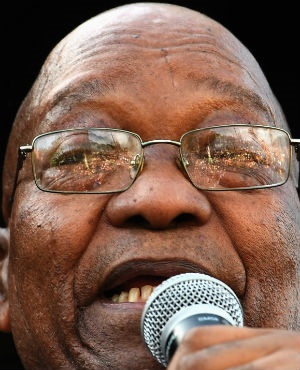
Former president Jacob Zuma has threatened to air the dirty laundry of those who keep talking about him in public. (Felix Dlangamandla, Netwerk24)
Multimedia · User Galleries · News in Pictures Send us your pictures · Send us your stories

Former president Jacob Zuma has threatened to air the dirty laundry of those who keep talking about him in public. (Felix Dlangamandla, Netwerk24)
Multimedia · User Galleries · News in Pictures Send us your pictures · Send us your stories

Anyone who has completed primary school would know the meaning of photosynthesis. In my days at primary school it was taught under the subject of biology.
Even former president Jacob Zuma wouldn't have missed lessons on this one. If he could recite parts of Shakespeare's Macbeth, as he often does when he reacts angrily to his political opponents, he surely would remember photosynthesis.
At the most basic level, it is a natural scientific process through which a plant generates carbohydrates from carbon dioxide and water in the presence of chlorophyll, a pigment that captures energy from sunlight. The effect of this process is that the plant grows.
A seemingly dead plant can recover if it's put in conditions where photosynthesis can take place. Sunlight, we were taught, is key to the process.
Which brings me back to Zuma. Since he was kicked out of office, his diary has been busy. He has appeared in court on charges of corruption and addressed school kids and church goers in KwaZulu-Natal.
He serves as a political consultant to conservative groups within the ANC that he tacitly encourages to show little or no respect to President Cyril Ramaphosa. Some of them are working on some narrow nationalist breakaway party.
He campaigned in a by-election in Nkandla. But, as the election results always show in that part of the world, the people know something many South Africans don't about Zuma.
He was seen at the ANC's land summit. One wonders why he would have a policy brainwave now that he is no longer in power; when he had power, he gave it to the imperialist Guptas in a clear violation of his oath of office.
Most recently, he was seen at the party's national executive committee (NEC) meeting. He has no sense of political etiquette and the unwritten rule that you allow your successor space to lead.
The clause in the ANC constitution that gives a former president an ex-officio status at the NEC is not meant to be taken literally as Zuma has done. At this rate, he will rock up at a lecture hall and demand to teach students on the basis that some obscure university has bestowed on him some honorary professorship in something. Or he'll go to church and demand to preach the word of God because some church ordained him as an honorary pastor.
The point, though, is that Zuma ominously casts a very dark shadow on the ANC, doing what he can to stop the political photosynthesis of the ANC and the country. His shadow is starving the ANC and the country of sunlight, literally blocking Ramaphosa's New Dawn.
Under Zuma's shadow, the recovery from destruction of the ANC and the near-collapse of South Africa's governance system will be slow and painful. His visibility serves as a galvanising incentive for his corrupt lieutenants who, according to Pravin Gordhan, are working hard to fight back against Ramaphosa's attempt to clean up the legacy of state capture.
Zuma and his coterie of blind followers do not seem to understand that he is dispensable. The party and the country are better off without him. The fact that he had always needed support from other leaders while he was president of the ANC doesn't mean that he is needed now.
Many would remember the embarrassment when an aged, frail and incoherent Nelson Mandela was made by Zuma's Polokwane brigade to address an ANC election campaign rally in the Eastern Cape. Zuma desperately needed Mandela's moral boost to legitimise his rise to power.
His supporters often spread rumours that former president Thabo Mbeki would campaign for the ANC during Zuma's reign – an indirect acknowledgement of Zuma's limitation. During the 2014 election campaign, ANC leaders in Gauteng did not want Zuma to join them in their campaign because he would be a repellant to "clever blacks". They wanted Mbeki and Motlanthe.
While Zuma's populist rhetoric hit home to unsuspecting citizens, some of his close allies knew that he could do better if he secured endorsement from leaders with better political reputations. At the ANC's 2012 elective conference in Mangaung, Zuma's supporters lured Ramaphosa to his slate as a deputy, not because they liked him.
But the idea was to shore up Zuma's floundering image as a morally bankrupt leader. Ramaphosa had always enjoyed a good reputation among South Africans. Now he has the opportunity to prove that they were not misguided in their belief that he was a good leader.
Unlike Zuma who needed support from former leaders, Ramaphosa can do without him. Much better would be if Zuma didn't wage an anti-Ramaphosa campaign. Even in KwaZulu-Natal, where Zuma's influence is often over-exaggerated due to narrow ethnic considerations, the ANC under Ramaphosa can still win elections in the absence of a strong opposition.
But to show his relevance and to leverage political support with the hope that the criminal charges – current and pending – will disappear, Zuma wants his dangerous shadow to continue to loom large.
The ANC should consider giving him an unsolicited leave of absence from party activities. After all, even his activism now is for personal advancement to the detriment of the party. Not only is it unsolicited, it's unnecessary.
- Mkhabela is a political analyst with the Department of Political Sciences at the University of South Africa.
Disclaimer: News24 encourages freedom of speech and the expression of diverse views. The views of columnists published on News24 are therefore their own and do not necessarily represent the views of News24.